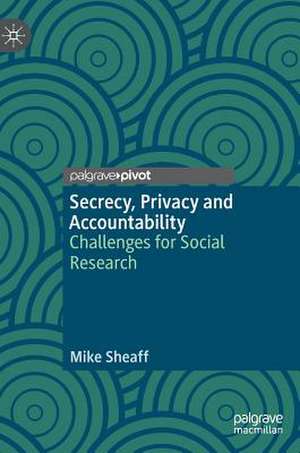Secrecy, Privacy and Accountability: Challenges for Social Research
Autor Mike Sheaffen Limba Engleză Hardback – 24 iul 2019
The Freedom of Information Act (FOIA) allows access to information about public organisations but can be in conflict with the Data Protection Act, protecting personal information. Exploring the use of the FOIA as a research tool, Sheaff offers a unique contribution to the development of sociological research methods, and debates connected to privacy and secrecy in the information age. This book will provide sociologists and social scientists with a fresh perspective on contemporary issues of power and control.
Preț: 381.48 lei
Nou
Puncte Express: 572
Preț estimativ în valută:
73.04€ • 76.06$ • 60.60£
73.04€ • 76.06$ • 60.60£
Carte tipărită la comandă
Livrare economică 13-27 februarie
Preluare comenzi: 021 569.72.76
Specificații
ISBN-13: 9783030116859
ISBN-10: 3030116859
Pagini: 139
Ilustrații: VIII, 151 p. 1 illus. in color.
Dimensiuni: 148 x 210 x 20 mm
Greutate: 0.41 kg
Ediția:1st ed. 2019
Editura: Springer International Publishing
Colecția Palgrave Pivot
Locul publicării:Cham, Switzerland
ISBN-10: 3030116859
Pagini: 139
Ilustrații: VIII, 151 p. 1 illus. in color.
Dimensiuni: 148 x 210 x 20 mm
Greutate: 0.41 kg
Ediția:1st ed. 2019
Editura: Springer International Publishing
Colecția Palgrave Pivot
Locul publicării:Cham, Switzerland
Cuprins
1. Introduction.- 2. Public and Private: Transparency and Responsibility.- 3. A Right to Privacy and a Right to Know.- 4. Secrecy and 'Studying-up'.- 5. FOIA and 'Studying-up:' A Case Study.- 6. Trust, Transparency and Privacy.
Notă biografică
Mike Sheaff is Associate Professor in Sociology at the University of Plymouth, UK.
Textul de pe ultima copertă
“Secrecy and fake news define our contemporary world. Mike Sheaff’s fascinating book is a timely investigation into the ways in which organisations can use a discourse of privacy to justify the withholding of information that threatens their power. Sheaff explores the implications of secrecy for trust in the ‘truths’ made available in the public sphere. This is essential reading for all who are interested in holding decision-makers to account.” – John Scott, Fellow of the British Academy and the Academy of Social Sciences; Visiting Professor, University of Essex, UK
“For anyone with an interest in the decline of public trust this important book marks a major advance in the sociological study of ‘dark secrets’. Mike Sheaff demonstrates how a critical and politically engaged sociologist might use the UK Freedom of Information Act to expose costs and consequences of institutional corruption that results under the worst excesses of neo-liberal governmental reforms. This is vitalpublic sociology.” Iain Wilkinson, Professor of Sociology, University Of Kent, UK
“Based on the author’s experiences investigating public sector bodies in the UK, Sheaff lays bare the nuances and complexities of doing investigative research and interpreting the results. Any social scientist who studies public sector activity should want to read this book.” – Kevin Walby, Associate Professor of Criminal Justice, University of Winnipeg, Canada
Public mistrust of those in authority and failings of public organisations frame disputes over attribution of responsibility between individuals and systems. Exemplified with examples, including the Aberfan disaster, the death of Baby P, and Mid Staffs Hospital, this book explores parallel conflicts over access to information and privacy.
The Freedom of Information Act (FOIA) allows access to information about public organisations but can be in conflict with the Data Protection Act, protecting personal information. Exploring the use of the FOIA as a research tool, Sheaff offers a unique contribution to the development of sociological research methods, and debates connected to privacy and secrecy in the information age. This book will provide sociologists and social scientists with a fresh perspective on contemporary issues of power and control.
“For anyone with an interest in the decline of public trust this important book marks a major advance in the sociological study of ‘dark secrets’. Mike Sheaff demonstrates how a critical and politically engaged sociologist might use the UK Freedom of Information Act to expose costs and consequences of institutional corruption that results under the worst excesses of neo-liberal governmental reforms. This is vitalpublic sociology.” Iain Wilkinson, Professor of Sociology, University Of Kent, UK
“Based on the author’s experiences investigating public sector bodies in the UK, Sheaff lays bare the nuances and complexities of doing investigative research and interpreting the results. Any social scientist who studies public sector activity should want to read this book.” – Kevin Walby, Associate Professor of Criminal Justice, University of Winnipeg, Canada
Public mistrust of those in authority and failings of public organisations frame disputes over attribution of responsibility between individuals and systems. Exemplified with examples, including the Aberfan disaster, the death of Baby P, and Mid Staffs Hospital, this book explores parallel conflicts over access to information and privacy.
The Freedom of Information Act (FOIA) allows access to information about public organisations but can be in conflict with the Data Protection Act, protecting personal information. Exploring the use of the FOIA as a research tool, Sheaff offers a unique contribution to the development of sociological research methods, and debates connected to privacy and secrecy in the information age. This book will provide sociologists and social scientists with a fresh perspective on contemporary issues of power and control.
Caracteristici
Offers an original and distinctive approach to combining sociological, legal, methodological and ethical issues Draws on the author’s first-hand experience of using the FOIA in his research to collect information that public bodies were reluctant to disclose Provides a key point of reference for those concerned with the potential for the Freedom of Information Act to serve as a research tool for critical social science
